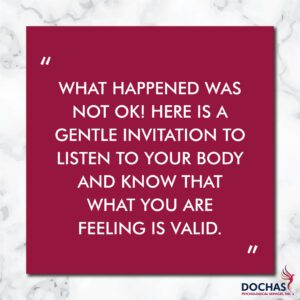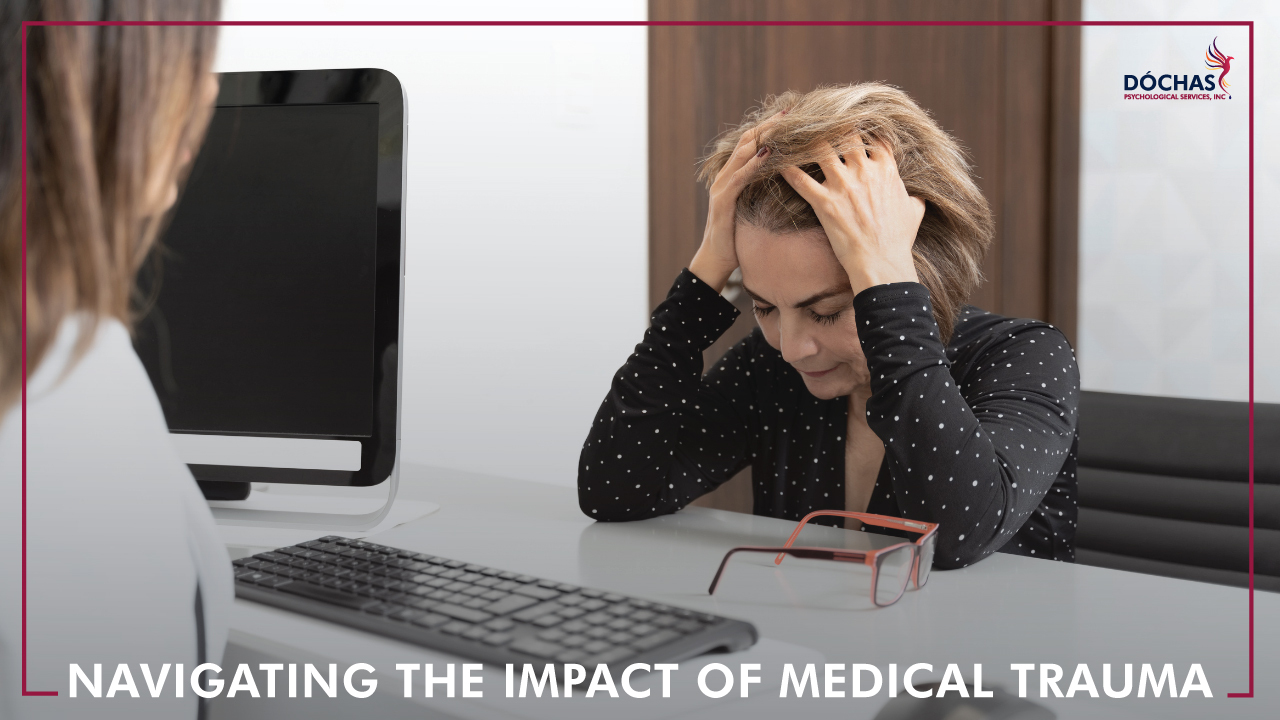Hello and welcome back to the Dóchas blog. Today it’s Pooja here, and I’d like to talk about the impact of medical trauma with you. You can probably imagine how confusing and disorienting it is when you go to people or places that are supposed to help and heal, and instead you have a negative or distressing experience. Maybe you’ve experienced this yourself. Navigating the impact of medical trauma can be challenging, so this blog will define what it is, what the symptoms are, and some tips for how to manage it.
What is medical trauma?
First, let’s define medical trauma.
Medical trauma can occur from a medical diagnosis and/or medical intervention where a serious threat to one’s life may have occurred.
It is not a term that you often hear as it describes a negative experience that occurs within a medical setting.
Just navigating medical issues is challenging enough, and anything to do with problems with your health can make you feel scared and uncertain already. So when an additional distressing experience occurs, it can have a big impact. Some examples of situations where medical trauma can occur are: a medical health professional misdiagnosing you; not being told of side effects, what to expect or alternative treatment options; rushing through the medical process or not spending enough time to understand your experience or needs; being judged, invalidated, humiliated, ignored, neglected or at any point especially when experiencing pain or distress, or experiencing a different standard of care due to age, gender, race, sexual orientation or religion.
These experiences can leave you confused, in shock and in emotional pain in addition to your medical experience.
Especially in cases of medical emergencies, things can happen so quickly that you struggle to process what is happening to you, leaving you feeling distressed afterwards. These experiences can leave you reluctant to seek out medical help in the future, and can leave a physiological and psychological impact on you.
All kinds of medical situations can lead to medical trauma, but some examples are:
- Being hospitalized for a medical condition
- Having surgery
- Being in ICU
- Experiencing a cardiac arrest or stroke
- Experiencing cancer
- Health complications as a child
- Pregnancy or birth-related complications
- Kidney dialysis
- Chronic pain or experiencing medical symptoms that cannot be explained.
What does medical trauma look like?
You might find yourself experiencing physiological and psychological responses when experiencing pain, injury, serious illness or medical interventions.
Symptoms can include, but are not limited to:
- Hyper-aroused states like panic attacks or angry outbursts
- Hypo-aroused states like numbness, lethargy, dissociation, low mood
- Negative emotions like anger, fear, shame, guilt,
- Intrusive thoughts that are health- or medical-related
- Re-experience sensations that remind you of the medical diagnosis or intervention
- Sensitive and avoidant of anything that would remind you of what happened
- Negative coping strategies like alcohol or substance use, overworking
- Physical health issues related to sleep, GI, migraines, chronic pain etc
- Experiencing a lack of trust in medical professionals or medical procedures
Medical trauma is a broad term. It can be subjective, and may lead to anxiety, depression, PTSD or chronic pain. However, it is not Posttraumatic Stress Disorder (PTSD) which is a separate mental health diagnosis with specific categories.
Managing the impact of medical trauma:
First, know that your experience is valid!
It is confusing to sit with conflicting feelings that come with medical trauma. It can be difficult to find the words or language to describe it, and it can feel lonely to try and make sense of what happened. Nonetheless, what happened was not ok! Here is a gentle invitation to listen to your body and know that what you are feeling is valid.
Next, reach out for support.
After experiencing medical trauma, you might feel mistrust in formal medical supports, and this can make overcoming medical trauma difficult. There is support available. Not all health professionals or interventions are equipped to support or manage medical trauma, so look for support that has the knowledge and understanding of this. A psychologist can work with you to validate your experience. They can work through understanding it with you in a non-judgemental way and explore tools to manage the impact you feel from it.
Have compassion for yourself. This can take time.
The journey through healing is not always linear. With that, there is permission to go at a comfortable pace and work with where you feel okay to be.

I hope these tips are helpful as you navigate your experience of medical trauma. Know that you are not alone in experiencing this.
If you would like to talk to a professional about your medical trauma, reach out to us here at Dóchas Psychological Services. One of our experienced professionals can sit down with you and help you navigate this. You can call us at 780 446 0300 or contact us by email at info@dochaspsych.com.
About Dóchas Psychological
Dóchas Psychological Services is a well-established and trusted therapy clinic located in Spruce Grove, Alberta. At Dóchas we value the idea that everyone deserves a safe space. Through connection and education, our team works hard to build a trustworthy relationship with each of our clients. It is our goal to create a community for our clients to feel like they belong.
Disclaimer
Information provided through Dóchas Psychological Services blogs or vlogs is meant for educational purposes only. They are NOT medical or mental health advice. You can read more about our disclaimer here.










